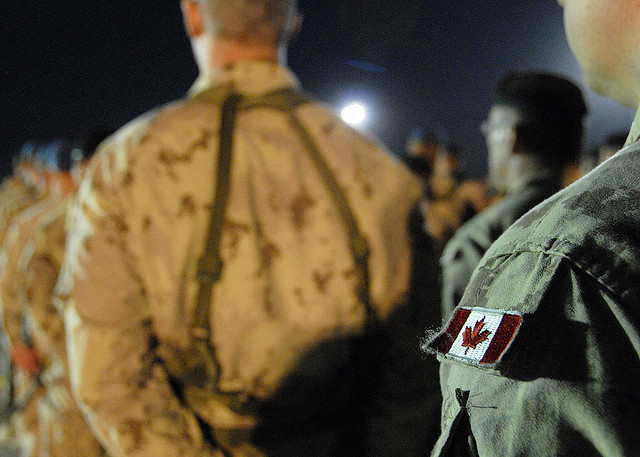The report from former Supreme Court Justice Marie Deschamps on sexual misconduct and harassment in the Canadian Armed Forces is blistering and powerful.
It describes “a sexualized environment in the armed forces … characterized by the frequent use of swear words and highly degrading expressions that reference women’s bodies, sexual jokes, innuendos, discriminatory comments with respect to the abilities of women, and unwelcome sexual touching…”
That would be bad enough.
But Deschamps goes on to say that this sexualized environment leads to the widespread “use of sex to enforce power relationships and to punish and ostracize a member of a unit.”
Military ‘accepts all 10 recommendations’: Really?
Shortly after the report was made public, on Thursday, the Parliamentary Secretary to the Minister of Defence, James Bezan, told the House of Commons that the government was deeply concerned.
He applauded the fact that the Canadian Armed Forces “had accepted” all 10 of Justice Deschamps’ recommendations.
That, however, is not necessarily the case.
The armed forces brass has fully accepted only two of the recommendations.
They agreed to the other eight “on principle” — whatever that is supposed to mean.
In particular, the armed forces leadership has not fully and unconditionally accepted Deschamps’ key recommendation that armed forces members who are victims of sexual assault or harassment should have an institutionalized means of seeking redress and assistance outside the military chain of command.
To understand how central and crucial that recommendation is one only need read how Dechamps describes the current system for dealing with complaints of sexual misconduct.
First, Deschamps says it is clear that victims of sexual misbehaviour are very reluctant to report what has happened to them.
They fear, Deschamps tells us, being labeled as troublemakers, being ostracized, suffering negative career consequences, and don’t expect their complaints to be taken seriously.
A redress process that makes matters worse
As for the minority of victims who do report their abuse, Deschamps argues that they face a process that might seem ridiculous, were it not so tragic for many armed forces members.
“Before a complaint of sexual harassment is finally resolved,” Deschamps explains, “the parties may have to pursue three separate stages of attempted resolution: a process of alternate dispute resolution (in which the complainant is encouraged to confront the alleged harasser informally), an administrative investigation by the Responsible Officer, and a grievance. This process is overly long and burdensome.”
Deschamps goes on to say that “pressure to settle complaints at the lowest level functions to stifle complaints and intimidate complainants; it has the very opposite effect of a zero tolerance policy [italics added].”
In other words, the military not only has a culture that fosters sexual victimization; its supposed means of redress only make matters worse.
The former Supreme Court judge has proposed a clear, concrete solution.
The military, she recommends, should “create an independent centre for accountability for sexual assault and harassment outside of the Canadian Armed Forces, with the responsibility for receiving reports of inappropriate sexual conduct, as well as prevention … victim support … and to act as a central authority for the collection of data.”
The key words here are “outside of the armed forces.” That would also mean outside of the established military chain of command.
Government has a history of ignoring expert recommendations
No wonder the military leadership is only willing to accept that recommendation “on principle.”
There is a good chance that, when push comes to shove, the military command and the Conservative government will look for an alternative to Deschamps’ “independent centre,” one that does not in any way diminish the power and authority of the military brass.
They may try to make it look like they’re acting on the Deschamps report.
But if there is no mechanism for those with complaints of sexual misconduct to go outside the military chain of command, it will be a sham.
This government has brazenly and almost gleefully ignored recommendations from its own experts on numerous occasions.
There were, for instance, the Chief Electoral Officer’s recommendations to prevent fraud and abuse in the electoral system.
The government’s response was the so-called Fair Elections Act, which not only paid little heed to most of what Chief Electoral Officer Marc Mayrand had proposed, in a number of instances it did the exact opposite.
Less well-known was the government’s response to the recommendations of its own National Panel on First Nations Education. That response came in the form of the now-dormant First Nations Control of Education Act.
As with the Fair Elections Act, the title here is entirely an oxymoron.
We will have more on that in this space very soon. Stay tuned.
And stay tuned and pay close attention to what the government actually does in response to Justice Deschamps’ thorough and very frightening report.
If the government and Armed Forces command do not implement Deschamps’ key recommendation of an independent centre for accountability for sexual assault and harassment — entirely outside the military — they will be betraying all of those victims of sexual misconduct who came forward to share their fears and concerns with the former Supreme Court judge.
Photo: flickr/ ResoluteSupportMedia



